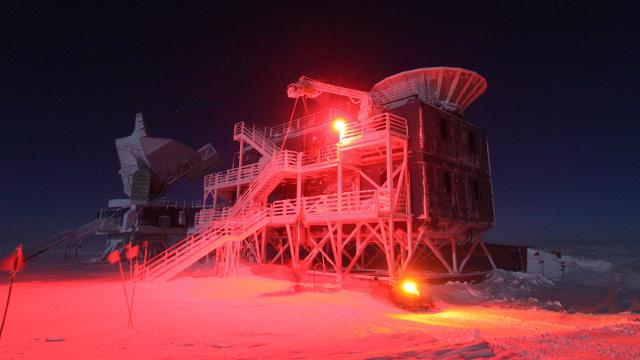Remember how a Harvard team found the first direct evidence of cosmic inflation right after the Big Bang? Well, now it’s published its findings — and it’s backtracking on its original claims.
Back in March, the team announced that it had used data from the telescope BICEP2 and observed primordial B-mode polarization in the Cosmic Microwave Background for the first time. They claimed that it was the first direct evidence of cosmic inflation right after the Big Bang — in others, that the Big Bang really was the beginning of it all.
Now, though, their research has been peer-reviewed and published in the journal Physical Review Letters. In it, the scientists are a little more sheepish about their findings.
That’s perhaps not surprising. As soon as the team posted their results online, other physicists aired doubts about the results. Mainly, they stemmed from the fact that the calibration techniques used by the team at BICEP 2 — which relied on a snapshot of the Cosmic Microwave Background acquired by the Planck satellite — underestimated the effects of cosmic dust as a contributing factor in their measurements of polarization.
Cosmic U-Turn
In the newly published paper, that part of the calibration is omitted, which in turn makes the results less convincing. “We don’t have a good handle on what the size of that dust signal is,” explained researcher Colin Bischoff of Harvard University to New Scientist. “We still maintain that our data favour a cosmological origin of the signal over a dust origin, but it’s not as strong.”
Indeed, recently published papers suggest that the Planck data being used underestimates the contributions from dust even more than the sceptical physicists first feared. The Harvard researchers write in a footnote on their paper that “[w]hile these papers do not offer definitive information on the level of dust contamination in our field, they do suggest that it may well be higher than any of the models considered.”
What does it all mean? Well, the finding certainly isn’t as important as we thought; while the observations may well indicate that cosmic inflation occurred right after the Big Bang, our confidence in the finding is certainly lower, far lower. Ultimately, if other teams can replicate the findings then they will hold water — but until then, we no longer really have definitive proof that the Big Bang really was the beginning of it all. But let’s not be too disheartened: this is how science advances, after all. [Physical Review Letters, New Scientist]
Picture: Steffen Richter/Bicep2
